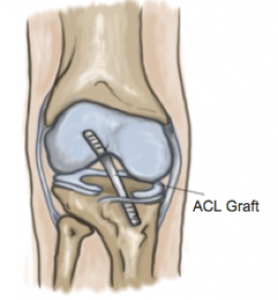CUMBERLAND PHYSIOTHERAPY PARRAMATTA: An ACL tear is one of the most dreaded sports injuries both for patients and therapists alike. Surgery and rehabilitation can be a tedious and difficult road, with full recovery taking up to 12 months in some cases.
What is an ACL?
The ACL (Anterior Cruciate Ligament) is a short, thick ligament in the centre of the knee joint that keeps the lower part of the leg firmly anchored to the upper part, preventing it from slipping forward.
The ACL exists to provide stability to the knee. Following a tear the knee can feel unstable and give way suddenly. This isn’t always a problem with day to day activities, however, as soon as you need to stress your knee more when running, jumping or with sports that require twisting such as netball or skiing, it can pose a much bigger problem.
What is the treatment?
Conventional wisdom has always been that when this ligament is torn completely the only pathway forward for a fully functioning and stable knee is reconstructive surgery and comprehensive rehabilitation. While small tendons tears can repair and heal themselves, a full thickness tear was believed to be incapable of healing on its own.
A growing body of evidence is being collected that some full thickness ACL tears are capable of regenerating and healing without surgery. Rehabilitation for ACL tears will focus on helping the other structures of the knee step up to compensate for any lost stability and can have surprisingly good results. For most people the presence or absence of a ligament in their knee isn’t important, the function of the knee is really what matters.
Do I still need surgery?
This new evidence is simply adding to the discussion that needs to happen after any serious injury. The right pathway for you will depend on a variety of factors, including your own personal goals, financial situation and motivation to undergo rehabilitation. At a minimum, a trial of physiotherapy rehabilitation should be considered prior to undergoing surgery should be considered.
If you want to know which option is best for you, have a chat with your physiotherapist about your personal circumstances and they can help you work through the pros and cons of any decision.
None of the information in this article is a replacement for proper medical advice. Always see a medical professional for advice on your injury.

